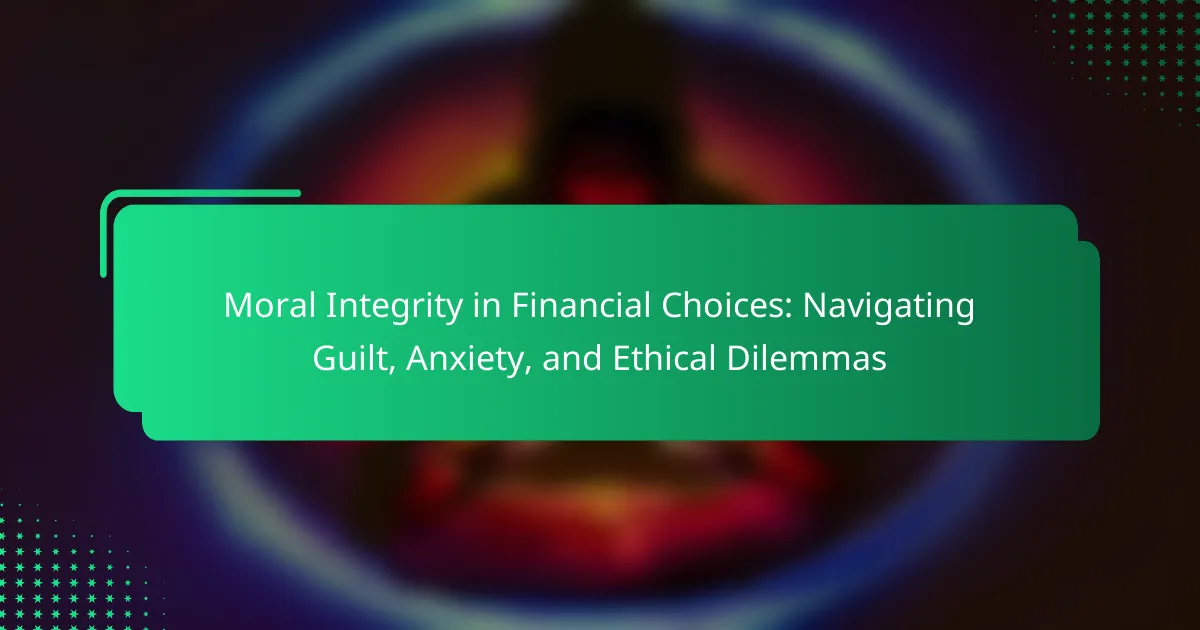Moral integrity in financial choices is crucial for aligning decisions with ethical standards. This article explores the impact of guilt and anxiety on financial decisions, examines ethical dilemmas arising from profit motives versus moral principles, and highlights attributes like honesty and accountability that guide ethical decision-making. It also addresses the influence of personal values and social pressures on financial integrity and offers strategies for enhancing moral integrity in financial choices.

What is the relationship between moral integrity and financial choices?
Moral integrity significantly influences financial choices, shaping decisions to align with ethical standards. Individuals often experience guilt and anxiety when financial decisions conflict with their values. This internal conflict can lead to stress and affect overall well-being. Ethical dilemmas arise when profit motives clash with moral principles, prompting individuals to reassess their priorities. Maintaining moral integrity in financial choices fosters trust and long-term relationships, enhancing both personal and professional spheres.
How do financial decisions impact mental health?
Financial decisions significantly affect mental health, often leading to feelings of guilt, anxiety, and ethical dilemmas. Poor financial choices can create stress and impact self-esteem, while ethical decision-making promotes mental well-being. Studies show that individuals who align their financial actions with their values experience lower anxiety levels. Additionally, navigating financial dilemmas can enhance personal growth and resilience. Addressing these issues requires awareness and proactive strategies to maintain moral integrity in financial choices.
What role does guilt play in money management?
Guilt significantly impacts money management by influencing financial decisions and behaviors. It can lead to anxiety over spending or saving, affecting overall financial health. Individuals often experience guilt when they perceive their financial choices as unethical or irresponsible. This emotional response can drive them to make more conservative financial decisions, aiming to restore a sense of moral integrity. Additionally, guilt may prompt individuals to prioritize debt repayment or charitable giving, reflecting their values and ethical considerations.
How to identify guilt in financial decisions?
Recognizing guilt in financial decisions involves assessing emotional responses and ethical considerations. Key indicators include feelings of anxiety, discomfort, or second-guessing after making choices. Reflecting on motivations and the impact of decisions on others can reveal underlying guilt.
What are the psychological effects of financial guilt?
Financial guilt can lead to anxiety, stress, and a sense of moral failure. Individuals may experience diminished self-esteem and increased emotional distress due to perceived ethical lapses in financial decisions. This guilt often manifests as chronic worry about financial stability and impacts relationships, causing isolation. Addressing financial guilt requires acknowledging feelings, reframing perspectives, and seeking support.
How does anxiety influence financial behavior?
Anxiety significantly impacts financial behavior by inducing stress that affects decision-making. Individuals may experience guilt over spending, leading to avoidance of necessary expenses. This emotional turmoil can result in erratic financial choices, such as impulsive purchases or excessive saving, driven by fear of future instability. Research indicates that anxiety can diminish moral integrity in financial decisions, complicating ethical dilemmas.
What triggers anxiety in financial situations?
Financial situations often trigger anxiety due to the fear of making unethical choices and facing moral dilemmas. Guilt arises when individuals believe their financial decisions conflict with their values. Additionally, uncertainty about financial stability can amplify feelings of anxiety. The pressure to conform to societal expectations regarding wealth and success further complicates these emotions.
How to cope with anxiety related to money?
To cope with anxiety related to money, focus on establishing moral integrity in financial choices. Acknowledge feelings of guilt and anxiety as valid, and practice mindful spending. Set clear financial goals to reduce uncertainty and enhance ethical decision-making. Regularly review your financial choices to align them with your values, fostering a sense of control and reducing anxiety.
What ethical dilemmas arise in financial decision-making?
Ethical dilemmas in financial decision-making often stem from conflicting values and pressures. Common issues include prioritizing profit over social responsibility, hiding financial risks, and manipulating information for personal gain. These dilemmas can lead to feelings of guilt and anxiety, impacting moral integrity. Addressing these challenges requires a commitment to transparency and ethical standards in financial practices.
How to navigate conflicts between personal values and financial gain?
To navigate conflicts between personal values and financial gain, prioritize ethical decision-making. Assess the long-term impact of financial choices on personal integrity. Evaluate potential guilt or anxiety associated with compromising values for profit. Seek alternatives that align financial goals with ethical standards, fostering a sense of fulfillment and peace.
What are common ethical pitfalls in financial choices?
Common ethical pitfalls in financial choices include prioritizing profit over integrity, succumbing to peer pressure, and neglecting long-term consequences. These dilemmas often lead to feelings of guilt and anxiety. Individuals may face unique challenges, such as justifying dishonest practices for perceived gains. Recognizing these pitfalls is essential for maintaining moral integrity in financial decisions.

What are the universal attributes of moral integrity in finance?
Moral integrity in finance encompasses honesty, accountability, transparency, and ethical decision-making. These attributes guide individuals in navigating guilt, anxiety, and ethical dilemmas. Honesty ensures truthful communication, while accountability involves taking responsibility for financial actions. Transparency fosters trust among stakeholders, and ethical decision-making prioritizes fairness and social responsibility. Collectively, these attributes create a framework for sound financial choices aligned with moral principles.
How do personal values shape financial decisions?
Personal values significantly influence financial decisions by guiding choices and priorities. Individuals often experience guilt or anxiety when their financial actions conflict with their moral beliefs. For instance, someone may avoid investing in companies that harm the environment, reflecting a commitment to sustainability. Ethical dilemmas arise when financial gain contradicts personal values, leading to stress and indecision. Ultimately, moral integrity shapes financial behavior, affecting spending, saving, and investment strategies.
What is the impact of societal norms on financial integrity?
Societal norms significantly influence financial integrity by shaping individuals’ perceptions of ethical behavior. These norms create expectations around honesty, accountability, and transparency in financial decisions. As a result, individuals often experience guilt or anxiety when their choices conflict with societal values. For example, a person may feel pressure to conform to peer spending habits, leading to financial strain and ethical dilemmas. Understanding these dynamics can help individuals navigate their financial choices more effectively, reinforcing moral integrity in their actions.

What unique factors influence moral integrity in financial choices?
Moral integrity in financial choices is influenced by personal values, social pressures, and emotional responses. Personal values dictate what individuals consider right or wrong in financial decisions. Social pressures, such as peer influence or societal norms, can create dilemmas that challenge one’s ethical stance. Emotional responses, including guilt and anxiety, often arise when decisions conflict with personal integrity. These factors interact uniquely, shaping how individuals navigate financial dilemmas and make choices aligned with their moral compass.
How does cultural background affect financial ethics?
Cultural background significantly influences financial ethics by shaping values and perceptions of morality. Different cultures prioritize varying aspects of financial integrity, such as honesty, transparency, and social responsibility. For instance, collectivist societies may emphasize community welfare, leading to ethical financial practices that consider the broader impact on society. In contrast, individualistic cultures might focus on personal gain, potentially creating ethical dilemmas when financial choices conflict with communal values. Understanding these cultural nuances can help navigate guilt and anxiety surrounding financial decisions.
What role does education play in shaping financial morals?
Education significantly shapes financial morals by instilling values and ethical frameworks. It influences decision-making processes, guiding individuals through guilt and anxiety related to financial choices. Studies indicate that financial literacy programs enhance moral integrity, fostering a sense of responsibility. Furthermore, education promotes awareness of ethical dilemmas, enabling individuals to navigate complex financial landscapes more effectively.

What are the rare attributes of moral integrity in finance?
The rare attributes of moral integrity in finance include authenticity, resilience against peer pressure, and a strong sense of accountability. Authenticity reflects a commitment to honesty, even when faced with challenges. Resilience against peer pressure allows individuals to maintain their ethical standards despite external influences. A strong sense of accountability ensures that financial decisions align with personal values, fostering trust and credibility. These attributes are essential in navigating ethical dilemmas and making sound financial choices.
How do extraordinary financial situations challenge moral integrity?
Extraordinary financial situations often lead individuals to compromise their moral integrity. High-stakes environments create pressure, causing guilt and anxiety over ethical dilemmas. People may justify unethical choices for financial gain, undermining their values. This conflict highlights the struggle between personal ethics and financial necessity, revealing how extreme circumstances can challenge one’s moral compass.
What are the long-term consequences of unethical financial decisions?
Unethical financial decisions can lead to long-term consequences such as damaged reputations, legal repercussions, and chronic guilt. These outcomes affect personal well-being and professional relationships. For instance, individuals may experience ongoing anxiety, impacting their decision-making abilities. Furthermore, organizations may face financial instability due to loss of trust from stakeholders. Ultimately, the long-term effects highlight the importance of moral integrity in financial choices.

How can individuals improve their moral integrity in financial choices?
Individuals can enhance their moral integrity in financial choices by adhering to ethical principles and reflecting on their decisions. Establishing clear values guides financial behavior and reduces guilt and anxiety. Regular self-assessment of financial decisions ensures alignment with personal ethics. Seeking advice from trusted mentors can provide perspective on ethical dilemmas. Additionally, creating a budget that prioritizes ethical spending reinforces commitment to moral integrity.
What best practices can enhance ethical decision-making in finance?
To enhance ethical decision-making in finance, prioritize transparency, accountability, and education. These best practices foster moral integrity and reduce guilt and anxiety in financial choices.
1. Promote transparency by openly sharing financial information and decision processes.
2. Establish accountability through clear roles and responsibilities for ethical conduct.
3. Provide ongoing education on ethical standards and dilemmas faced in finance.
4. Encourage open discussions about ethical challenges to foster a supportive environment.
5. Implement a robust framework for reporting unethical behavior without fear of retaliation.
What common mistakes should be avoided in financial ethics?
To maintain moral integrity in financial choices, avoid these common mistakes: failing to disclose conflicts of interest, prioritizing profit over ethics, neglecting due diligence, underestimating the impact of decisions, and ignoring regulatory compliance. Each mistake can lead to significant guilt and anxiety, undermining ethical standards.
How to cultivate a mindset of financial integrity?
To cultivate a mindset of financial integrity, prioritize ethical decision-making and self-awareness in financial choices. Acknowledge feelings of guilt and anxiety as signals to reassess your values. Establish clear financial goals aligned with your ethical beliefs, which fosters a sense of responsibility. Regularly reflect on your financial decisions to ensure they align with your principles. Engage in discussions about financial ethics to broaden your perspective and reinforce your commitment to integrity.


